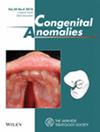A novel homozygous splice site variant in CERS3 causes autosomal recessive congenital ichthyosis
IF 1.6
4区 医学
Q3 PEDIATRICS
引用次数: 0
Abstract
F IGURE 1 (A) Pedigree drawing of a family segregating autosomal recessive congenital ichthyosis. The circles symbolize females and the squares male individuals of the family. A shaded circle or square represents an affected while an unshaded symbol represents normal individuals. Double lines specify consanguineous marriages. Roman and Arabic numbers define the generation position and the number of members within a generation in pedigree. Those members whose blood was collected are represented with asterisks (*) in the pedigree. (B) The affected individual (IV-5) had skin dryness and black scales on the back of the neck, elbow, back, and legs. Stiff and hard skin at hands, and hyperkeratosis over feet in an affected individual (IV-4). (C) Sequencing chromatogram illustrating sequencing of the coding exon 8 of CERS3 in the affected, carrier, and normal individual. The black arrow indicates the nucleotide change in the sequence. (D) CERS3 gene and protein structure. The gene consists of 13 exons. Ceramide synthase 3 has a homeobox domain (gray), six transmembrane domains (TMD; dark blue), and a cytoplasmic domain (orange). Autosomal recessive congenital ichthyosis (ARCI) is a heterogeneous group of nonsyndromic inherited ichthyosis seen at birth and characterized by hyperkeratosis and scaling. To date, variants in 14 different genes, including TGM1, CERS3, ABCA12, ALOX12B, ALOXE3, CYP4F2, NIPAL4, PNPLA1, CYP4F22, ST14, SDR9C7, SULT2B1, SLC27A4, and LIPN causing ARCI have been reported. The study here reports a Received: 3 October 2022 Revised: 19 February 2023 Accepted: 22 March 2023一种新的纯合剪接位点变异在CERS3引起常染色体隐性先天性鱼鳞病
本文章由计算机程序翻译,如有差异,请以英文原文为准。
求助全文
约1分钟内获得全文
求助全文
来源期刊

Congenital Anomalies
PEDIATRICS-
自引率
0.00%
发文量
49
审稿时长
>12 weeks
期刊介绍:
Congenital Anomalies is the official English language journal of the Japanese Teratology Society, and publishes original articles in laboratory as well as clinical research in all areas of abnormal development and related fields, from all over the world. Although contributions by members of the teratology societies affiliated with The International Federation of Teratology Societies are given priority, contributions from non-members are welcomed.
 求助内容:
求助内容: 应助结果提醒方式:
应助结果提醒方式:


